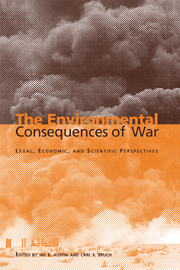Book contents
- Frontmatter
- Contents
- List of illustrations
- List of tables
- List of contributors
- Acknowledgements
- Foreword by Klaus Toepfer
- Introduction
- Part I General principles
- Part II The legal framework
- Introduction
- 2 The law of war and environmental damage
- 3 War and the environment: fault lines in the prescriptive landscape
- 4 The inadequacy of the existing legal approach to environmental protection in wartime
- 5 United States Navy development of operational-environmental doctrine
- 6 In furtherance of environmental guidelines for armed forces during peace and war
- Introduction
- 7 Peacetime environmental law as a basis of state responsibility for environmental damage caused by war
- 8 Environmental damages under the Law of the Sea Convention
- 9 The place of the environment in international tribunals
- 10 Civil liability for war-caused environmental damage: models from United States law
- Part III Assessing the impacts – scientific methods and issues
- Part IV Valuing the impacts – economic methods and issues
- Part V Prospects for the future
- Index
4 - The inadequacy of the existing legal approach to environmental protection in wartime
Published online by Cambridge University Press: 04 August 2010
- Frontmatter
- Contents
- List of illustrations
- List of tables
- List of contributors
- Acknowledgements
- Foreword by Klaus Toepfer
- Introduction
- Part I General principles
- Part II The legal framework
- Introduction
- 2 The law of war and environmental damage
- 3 War and the environment: fault lines in the prescriptive landscape
- 4 The inadequacy of the existing legal approach to environmental protection in wartime
- 5 United States Navy development of operational-environmental doctrine
- 6 In furtherance of environmental guidelines for armed forces during peace and war
- Introduction
- 7 Peacetime environmental law as a basis of state responsibility for environmental damage caused by war
- 8 Environmental damages under the Law of the Sea Convention
- 9 The place of the environment in international tribunals
- 10 Civil liability for war-caused environmental damage: models from United States law
- Part III Assessing the impacts – scientific methods and issues
- Part IV Valuing the impacts – economic methods and issues
- Part V Prospects for the future
- Index
Summary
An introductory perspective on the environmental law of war
This chapter takes issue with the prevailing consensus among international law experts that existing legal norms and standards provide an adequate foundation for environmental protection and assessment of liability arising from wartime damage. This conviction of adequacy appears to be based on several distinct, and complementary, lines of reasoning: first of all, that these existing norms and standards establish a reasonably workable and practical balance in combat settings between environmental protection and the pursuit of military necessity; second, that any further weighting of this legal balance in favor of environmental protection would be politically futile and legally demoralizing, as it would not elicit necessary support from important governments, especially that of the United States; third, that the attempt to produce a more coherent and comprehensive legal framework would result in an unwieldy and time-consuming process, possibly encompassing as much as several decades from start to finish; and fourth, that by far the most constructive available means to strengthen environmental protection in wartime would be to devote greater energy to the implementation of existing standards, and thereby to forget chasing after the rainbow of a more ambitiously coherent and restrictive approach.
There is much that is appealing about adopting such a modest demeanor. It is certainly correct that significant additional work could be done by way of implementing existing environmental standards in both preventive and reactive modes. Such activity might well demonstrate that restrictions on environmentally harmful tactics in wartime are to be taken more seriously by political leaders and military commanders than in the past.
- Type
- Chapter
- Information
- The Environmental Consequences of WarLegal, Economic, and Scientific Perspectives, pp. 137 - 155Publisher: Cambridge University PressPrint publication year: 2000
- 4
- Cited by



